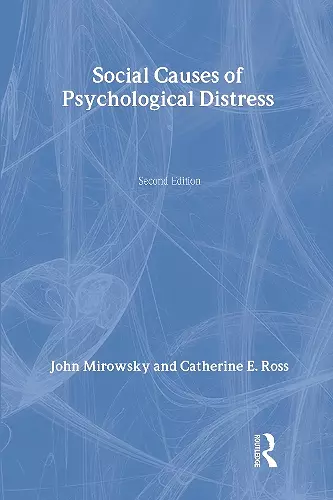Social Causes of Psychological Distress
Format:Hardback
Publisher:Taylor & Francis Inc
Published:31st Mar '03
Currently unavailable, our supplier has not provided us a restock date
This hardback is available in another edition too:
- Paperback£43.99(9780202307091)

A core interest of social science is the study of stratification--inequalities in income, power, and prestige. Few persons would care about such inequalities if the poor, powerless, and despised were as happy and fulfilled as the wealthy, powerful, and admired. Social research often springs from humanistic empathy and concern as much as from scholarly and scientific curiosity. An economist might observe that black Americans are disproportionately poor, and investigate racial differences in education, employment, and occupation that account for disproportionate poverty. A table comparing additional income blacks and whites can expect for each additional year of education is thus as interesting in its own right as any dinosaur bone or photo of Saturn. However, something more than curiosity underscores our interest in the table. Racial differences in status and income are a problem in the human sense. Inequality in misery makes social and economic inequality personally meaningful. There are two ways social scientists avoid advocacy in addressing issues of social stratification. The first way is to resist projecting personal beliefs, values, and responses as much as possible, while recognizing that the attempt is never fully successful. The second way is by giving the values of the subjects an expression in the research design. Typically, this takes the form of opinion or attitude surveys. Researchers ask respondents to rate the seriousness of crimes, the appropriateness of a punishment for a crime, the prestige of occupations, the fair pay for a job, or the largest amount of money a family can earn and not be poor, and so on. The aggregate judgments, and variations in judgments, represent the values of the subjects and not those of the researcher. They are objective facts with causes and consequences of interest in their own right. This work is an effort to move methodology closer to human concerns without sacrificing the scientific grounds of research as such. The authors succeed admirably in this complex and yet worthwhile task. This is a work that could be helpful to those in all branches of the social sciences that take up issues relating to inequality and the uneven distribution of the social goods of a nation. John Mirowsky and Catherine E. Ross are professors in the Department of Sociology and Population Research Center at the University of Texas.
"It comes at a time when the prevailing zeitgeist in psychiatry and psychiatric epidemiology devalues social explanations, dimensional approaches to symptoms, and survey designs and favors instead biological explanations, diagnostic approaches, and experimental designs. This zeitgeist deserves to be challenged." American Journal of Sociology
ISBN: 9780202307084
Dimensions: unknown
Weight: 566g
320 pages
2nd edition